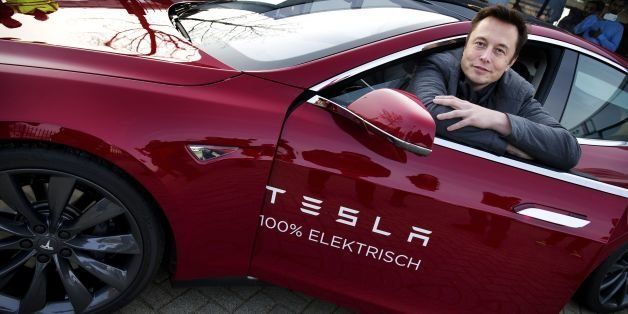Nathan Gardels is the editor-in-chief of Noema Magazine. He is also the co-founder of and a senior adviser to the Berggruen Institute.
Two signal events are contesting to shape our future this week. Like a bad dream, the Iraq jihadis and the Taliban returned again with their bloody battles fueled by oil interests and close-minded religious and tribal fanaticism. With his utopian vision, Tesla’s Elon Musk pledged to open source his precious patents, as the WorldPost reports, in order to spur the great break from fossil to renewable fuels. First came the Taliban attacks on Jinnah International Airport in Karachi. As rumors of a military coup sweep the country, Pakistani journalist Saeed Qureshi writes that, if political leaders don’t act decisively, the military should move “on its own volition” to suppress the Taliban “once and for all.” Writing about the cancellation of a flight from Colombo to Karachi, Akbar S. Ahmed ponders if Sri Lanka’s experience with the Tamil rebels holds any lessons for Pakistan.
Then, suddenly, Iraq burst into turmoil. As the fanatical Islamic State in Iraq and Syria advances on Baghdad, Hillary Clinton warns that the situation is getting “wickeder.” As the WorldPost reports, she fears the establishment of a new pan-Islamic proto-state across Sunni swaths of Syria and Iraq. Juan Cole, doyen of scholars on Islamists in the region, puts the fall of Mosul in historical context going back to when the British Empire drew all the maps. The WorldPost’s Sophia Jones reports from Erbil, Iraq, where residents of the besieged city of Mosul ask which is worse, extremists or the government?
This week also marked the fifth anniversary of Iran’s Green Movement. Prominent Iranian dissident Akbar Ganji writes that, far from defeated, the movement’s democratic sentiments are embedded in the body politic and will emerge again in the unique dance of Iran’s political system between religious dictatorship and competitive elections.
As the World Cup gets underway in Brazil, Jerry Davila writes from Sao Paulo that, by forcing a focus on Brazil’s development gaps — much as the 1968 Olympics did for Mexico with its famous Tlatelolco student demonstrations — democracy will ultimately be enhanced. Colombian writer Adriana Aristizabal lays out the high stakes in Colombia’s presidential elections that center on the public’s uncertainty over current President Juan Manuel Santos’ peace plan with the FARC rebels.
Elsewhere on WorldPost, Russian comedian Yakov Smirnoff pokes fun at Putin by recalling his experience with (this is no joke) The Humor Department of the Censorship Apparatus of the Soviet Ministry of Culture.
In digital affairs, German journalist Wolfgang Mulke explains why Germans see Google as “a digital feudal lord.” DigitalBeyond.com founder Evan Carroll explores how “virtual immortality” robotics will allow you to talk to your grandchildren long after you are dead.
WHO WE ARE
EDITORS: Nathan Gardels, Senior Advisor to the Berggruen Institute on Governance and the long-time editor of NPQ and the Global Viewpoint Network of the Los Angeles Times Syndicate/Tribune Media, is the Editor-in-Chief of The WorldPost. Farah Mohamed is the Managing Editor of The WorldPost. Kathleen Miles is the Senior Editor of the WorldPost. Alex Gardels is the Associate Editor of The WorldPost. Nicholas Sabloff is the Executive International Editor at the Huffington Post, overseeing The WorldPost and HuffPost’s 10 international editions. Cosima Ungaro is Deputy International Editor at the Huffington Post and Eline Gordts is HuffPost’s World Editor.
CORRESPONDENTS: Max Rosenthal in Beirut; Sophia Jones in Cairo; Matt Sheehan in Beijing.
EDITORIAL BOARD: Nicolas Berggruen, Nathan Gardels, Arianna Huffington, Eric Schmidt (Google Inc.), Pierre Omidyar (First Look Media) Juan Luis Cebrian (El Pais/PRISA), Walter Isaacson (Aspen Institute/TIME-CNN), John Elkann (Corriere della Sera, La Stampa), Wadah Khanfar (Al Jazeera), Dileep Padgaonkar (Times of India) and Yoichi Funabashi (Asahi Shimbun).
CONTRIBUTING EDITORS: Moises Naim (former editor of Foreign Policy) and Nayan Chanda (Yale/Global; Far Eastern Economic Review). Katherine Keating (One-On-One) and Jehangir Pocha (NewsX India) .
The Asia Society and its ChinaFile, edited by Orville Schell, is our primary partner on Asia coverage. Eric X. Li and the Chunqiu Institute/Fudan University in Shanghai and Guancha.cn also provide first person voices from China. We also draw on the content of China Digital Times. Seung-yoon Lee is The WorldPost link in South Korea.
Jared Cohen of Google Ideas provides regular commentary from young thinkers, leaders and activists around the globe. Bruce Mau provides regular columns from MassiveChangeNetwork.com on the “whole mind” way of thinking. Patrick Soon-Shiong is Contributing Editor for Health and Medicine.
ADVISORY COUNCIL: Members of the Berggruen Institute’s 21st Century Council and Council for the Future of Europe serve as the Advisory Council — as well as regular contributors — to the site. These include, Jacques Attali, Shaukat Aziz, Gordon Brown, Fernando Henrique Cardoso, Juan Luis Cebrian, Jack Dorsey, Mohamed El-Erian, Francis Fukuyama, Felipe Gonzalez, John Gray, Reid Hoffman, Fred Hu, Mo Ibrahim, Alexei Kudrin, Pascal Lamy, Kishore Mahbubani, Alain Minc, Dambisa Moyo, Laura Tyson, Elon Musk, Pierre Omidyar, Raghuram Rajan, Nouriel Roubini, Nicolas Sarkozy, Eric Schmidt, Gerhard Schroeder, Peter Schwartz, Amartya Sen, Jeff Skoll, Michael Spence, Joe Stiglitz, Larry Summers, Wu Jianmin, George Yeo, Fareed Zakaria, Ernesto Zedillo, Ahmed Zewail, and Zheng Bijian.
From the Europe group, these include: Marek Belka, Tony Blair, Jacques Delors, Niall Ferguson, Anthony Giddens, Otmar Issing, Mario Monti, Robert Mundell, Peter Sutherland and Guy Verhofstadt.
MISSION STATEMENT
The WorldPost is a global media bridge that seeks to connect the world and connect the dots. Gathering together top editors and first person contributors from all corners of the planet, we aspire to be the one publication where the whole world meets.
We not only deliver breaking news from the best sources with original reportage on the ground and user-generated content; we bring the best minds and most authoritative as well as fresh and new voices together to make sense of events from a global perspective looking around, not a national perspective looking out.





